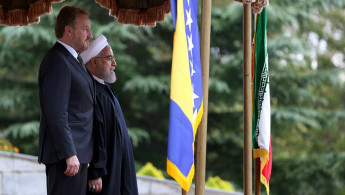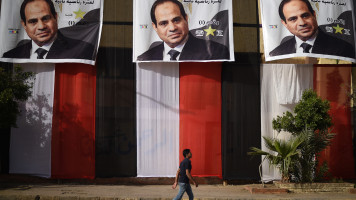Iran and Bosnia: Buddying up in the post-sanctions era
Earlier this week, Iran and Bosnia and Herzegovina signed a memorandum of understanding on the promotion of business cooperation and mutual investment.
The memorandum envisions the expansion of cooperation between the two countries' enterprises and industrial parks, according to Iranian state media.
The development marks the enhancement of ties between the two states since Iran re-joined the global economy following the dropping of nuclear-related sanctions against Tehran in January.
Post sanction developments
In February, after the deal Bosnian Foreign Minister Igor Crnadak was quick to appear in Tehran to discuss "many ways to increase our (Bosnia and Herzegovina's) economic cooperation" with Iran.
At that time Crnadak earmarked potential cooperation in travel and tourism, joint education and cultural programmes, and a simplified visa arrangement between the two states, as means of enhancing ties.
Speaking on Tuesday following a meeting with Bakir Izetbegovic, the Bosniak member of the tripartite presidency of Bosnia and Herzegovina, Iranian President Hassan Rouhani praised the Balkan state for its efforts in ensuring "peaceful coexistence" among Muslims, Serbs, and Croats.
Rouhani also notably stated that "the promotion of moderate Islam can serve as a major cultural basis for European Muslims, including those of Bosnia and Herzegovina".
For his part Izetbegovic stated that "radicalism … compromises our [Muslim] faith and presents it in the wrong light", adding that in addition to plans to expand business cooperation, the two states had also agreed to cooperate "in combatting terrorism and extremism".
In August, a conference hosted in the Chechen capital of Grozny involving some 200 Sunni scholars from around the world caused controversy after religious leaders from Saudi Arabia - which claims to be the foremost representatives of Sunni Islam in the world - were excluded.
The conference was aimed in part at defining the term Ahl al-Sunna - a classification denoting the Sunni community of Islam.
Saudi Arabia's exclusion from proceedings led some analysts to claim that the conference had been organised with the supervision of Russian and Iranian intelligence.
Old allies
In the Bosnian war (1992-1995) Iran, which is a majority Shia state controlled by a Shia theocratic regime, was one of the first Muslim countries to provide armed support for the predominantly Sunni Bosniaks.
In total between May 1994 and January 1996, Iran is said to have transported over 5,000 tonnes of military equipment to Bosnia. The Iranian Revolutionary Guards officials and members of the Tehran-backed Shia paramilitary group Hizballah also travelled to the country to provide logistic support.
While Tehran and Sarajevo have remained allies since in 2013 a temporary frosting over of relations took place when two Iranian diplomats were expelled from the country after being accused of spying.
Interestingly, at that time one of the charges levelled against the two diplomats, Hamzeh Doolab Ahmad and Jadidi Sohrab, was of using their diplomatic status to contact Wahhabi leaders in the country.
At that time when contacted by AFP the Iranian embassy in Sarajevo chose not to comment.
However, these days - particularly following the lifting of sanctions against Iran - it appears that increasingly Tehran and Sarajevo have rather a lot to say about one another - most of it involves platitudes and praise, with such rhetoric matched by enhanced trade and even security cooperation.



